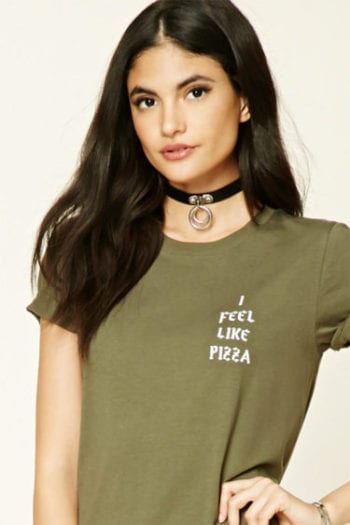There is an unspoken rule when it comes to purchasing clothing: Forever 21 will always have the knockoff.[1] While most stores would take measures to avoid such a veputation, Forever 21 embraces it. In fact, America’s 5th largest specialty retailer incorporates this very idea into its business plan.[2]
Since the company’s inception, various designers, including Anna Sui and Diane von Furstenberg, have sued Forever 21 over 50 times for copyright infringement.[3] These suits, however, do not include the various independent designers who are unable to garner legal representation or file suit.[4] Among the latter includes Marta Freedman, creator of popular Instagram account, Hot Girls Eating Pizza.[5]
In October, Freedman publicly criticized the retailer for allegedly copying her T-shirt design, which parodies Kanye West’s The Life of Pablo merchandise; Freedman’s shirt bears the words “I feel like Pizza” instead of “I feel like Pablo.”[6] As for Forever 21’s version, it also reads “I feel like Pizza,” but in a slightly wider font and is army green instead of Freedman’s heather gray.[7] Although Freedman does not plan to pursue litigation, she discussed with Nylon magazine her main reason for calling out the store: making consumers aware.[8] “My T-shirt was made as a nod to Kanye, Forever 21’s shirt was made to make money . . . I’m lucky enough to have a full-time job in addition to running Hot Girls Eating Pizza . . . I really feel for those designers, artists, and collectives—whose artwork is their livelihood—that lose rent money over . . . a Forever 21 knockoff.”[9]
With such a well-documented and public history of infringement allegations, how has Forever 21 continuously managed to escape liability?[10] Copyright laws exist to incentivize and promote innovation of science and arts for the benefit of the greater public.[11] Whereas patents protect inventions, copyrights protect works of authorship such as books, movies, and computer software; patents protect ideas and copyrights protect expressions of ideas.[12] In order for clothing to be eligible for copyright protection, the aesthetic elements of the article must be separable from its functionality.[13] Since it is quite difficult to distinguish the form of clothing from its function, clothing designers are often left with only two possible legal remedies: a design patent (requires a showing of “new and non-obvious” utility) or trademark protection (requires recognizable reputation, continuous advertising, and widespread sales).[14] Because of the difficulty associated with acquiring these remedies, fashion designers, especially nascent and independent designers, are generally helpless against knockoffs.[15]
Interestingly, due to the nature of the “fast fashion” industry, Forever 21 oftentimes is not aware it is supplying a knockoff to consumers, or so its representatives say.[16] Jin Sook Chang, who founded Forever 21 with her husband Do Won Chang, and her buying team allegedly review 400 new pieces a day in order to meet consumer demand.[17] Because of the high turnaround of merchandise, these buyers do not have time to investigate and ensure that each vendor is not replicating other label designs.[18] In her 2009 testimony for Trovato’s infringement case against the retailer, Chang testified, “We simply trust the vendors, and then they manufacture [and supply] the garment for us . . . .”[19] Due to this implicit trust, Forever 21 treats potential liability as a sunk cost of doing business.[20]
During the trial for Anthropologie’s copyright infringement case against Forever 21, then-Executive Vice President Larry Meyer addressed the company’s “extraordinary litigating history.”[21] “The number of claims against us is relatively small compared to the number of items we sell. Now we have a process to ensure that our products do not violate the intellectual property rights of others,” he said.[22] Other than “trust,” what is this exact process? In an interview with The Guardian, Linda Chang, daughter of Do Won and Jin Sook Chang and Forever 21’s Marketing Manager, attempted to clarify what this supposed responsive measure is.[23] “We’ve never settled . . . We’re not manufacturing goods ourselves and we’ve put legal procedures in place [to avoid breaching copyright],” she said.[24] Despite her declaration, it seems that Forever 21 always settles; settlement is the retailer’s elusive protective measure for copyright infringement allegations.[25]
As the fast fashion industry continues to grow and outpace other affordable competitors, the demand for low-cost designer knockoffs will likely only worsen.[26] Until copyright protection is easily extended to clothing, the works of both reputable and nascent designers will remain vulnerable against Forever 21’s replication. As for Forever 21, the 4.4-billion-dollar empire will likely continue covering settlement costs and conducting business as usual.[27]

